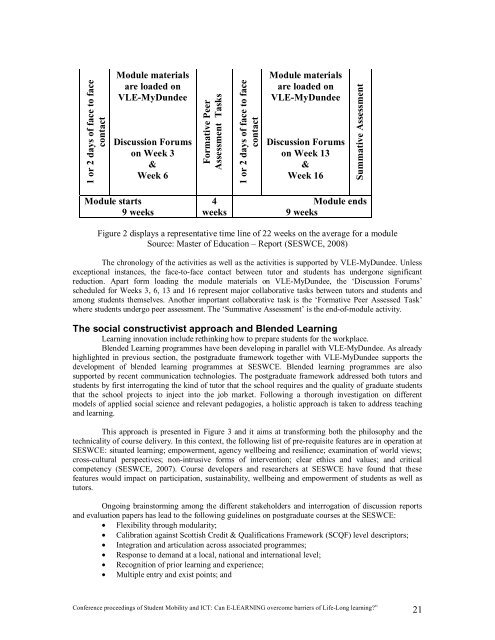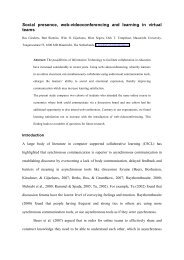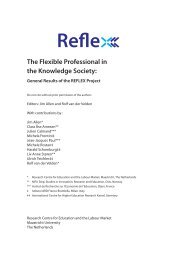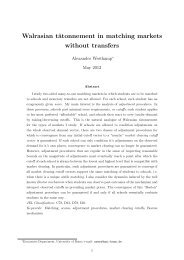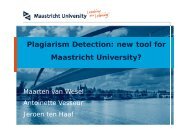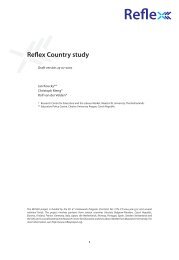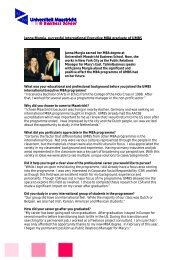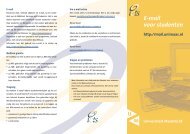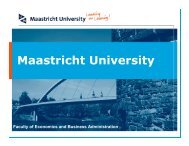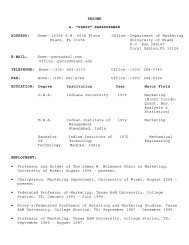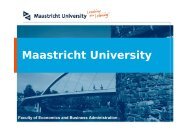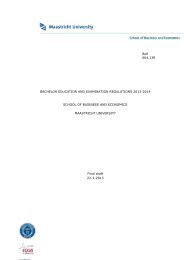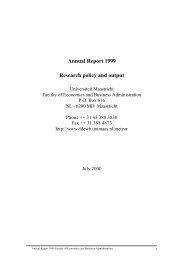proceedings of Student Mobility and ICT: Can E-LEARNING
proceedings of Student Mobility and ICT: Can E-LEARNING
proceedings of Student Mobility and ICT: Can E-LEARNING
You also want an ePaper? Increase the reach of your titles
YUMPU automatically turns print PDFs into web optimized ePapers that Google loves.
1 or 2 days <strong>of</strong> face to face<br />
contact<br />
Module materials<br />
are loaded on<br />
VLE-MyDundee<br />
Discussion Forums<br />
on Week 3<br />
&<br />
Week 6<br />
Module starts<br />
9 weeks<br />
Formative Peer<br />
Assessment Tasks<br />
4<br />
weeks<br />
1 or 2 days <strong>of</strong> face to face<br />
contact<br />
Module materials<br />
are loaded on<br />
VLE-MyDundee<br />
Discussion Forums<br />
on Week 13<br />
&<br />
Week 16 Summative Assessment<br />
Module ends<br />
9 weeks<br />
Figure 2 displays a representative time line <strong>of</strong> 22 weeks on the average for a module<br />
Source: Master <strong>of</strong> Education – Report (SESWCE, 2008)<br />
The chronology <strong>of</strong> the activities as well as the activities is supported by VLE-MyDundee. Unless<br />
exceptional instances, the face-to-face contact between tutor <strong>and</strong> students has undergone significant<br />
reduction. Apart form loading the module materials on VLE-MyDundee, the ‘Discussion Forums’<br />
scheduled for Weeks 3, 6, 13 <strong>and</strong> 16 represent major collaborative tasks between tutors <strong>and</strong> students <strong>and</strong><br />
among students themselves. Another important collaborative task is the ‘Formative Peer Assessed Task’<br />
where students undergo peer assessment. The ‘Summative Assessment’ is the end-<strong>of</strong>-module activity.<br />
The social constructivist approach <strong>and</strong> Blended Learning<br />
Learning innovation include rethinking how to prepare students for the workplace.<br />
Blended Learning programmes have been developing in parallel with VLE-MyDundee. As already<br />
highlighted in previous section, the postgraduate framework together with VLE-MyDundee supports the<br />
development <strong>of</strong> blended learning programmes at SESWCE. Blended learning programmes are also<br />
supported by recent communication technologies. The postgraduate framework addressed both tutors <strong>and</strong><br />
students by first interrogating the kind <strong>of</strong> tutor that the school requires <strong>and</strong> the quality <strong>of</strong> graduate students<br />
that the school projects to inject into the job market. Following a thorough investigation on different<br />
models <strong>of</strong> applied social science <strong>and</strong> relevant pedagogies, a holistic approach is taken to address teaching<br />
<strong>and</strong> learning.<br />
This approach is presented in Figure 3 <strong>and</strong> it aims at transforming both the philosophy <strong>and</strong> the<br />
technicality <strong>of</strong> course delivery. In this context, the following list <strong>of</strong> pre-requisite features are in operation at<br />
SESWCE: situated learning; empowerment, agency wellbeing <strong>and</strong> resilience; examination <strong>of</strong> world views;<br />
cross-cultural perspectives; non-intrusive forms <strong>of</strong> intervention; clear ethics <strong>and</strong> values; <strong>and</strong> critical<br />
competency (SESWCE, 2007). Course developers <strong>and</strong> researchers at SESWCE have found that these<br />
features would impact on participation, sustainability, wellbeing <strong>and</strong> empowerment <strong>of</strong> students as well as<br />
tutors.<br />
Ongoing brainstorming among the different stakeholders <strong>and</strong> interrogation <strong>of</strong> discussion reports<br />
<strong>and</strong> evaluation papers has lead to the following guidelines on postgraduate courses at the SESWCE:<br />
• Flexibility through modularity;<br />
• Calibration against Scottish Credit & Qualifications Framework (SCQF) level descriptors;<br />
• Integration <strong>and</strong> articulation across associated programmes;<br />
• Response to dem<strong>and</strong> at a local, national <strong>and</strong> international level;<br />
• Recognition <strong>of</strong> prior learning <strong>and</strong> experience;<br />
• Multiple entry <strong>and</strong> exist points; <strong>and</strong><br />
Conference <strong>proceedings</strong> <strong>of</strong> <strong>Student</strong> <strong>Mobility</strong> <strong>and</strong> <strong>ICT</strong>: <strong>Can</strong> E-<strong>LEARNING</strong> overcome barriers <strong>of</strong> Life-Long learning?” 21


